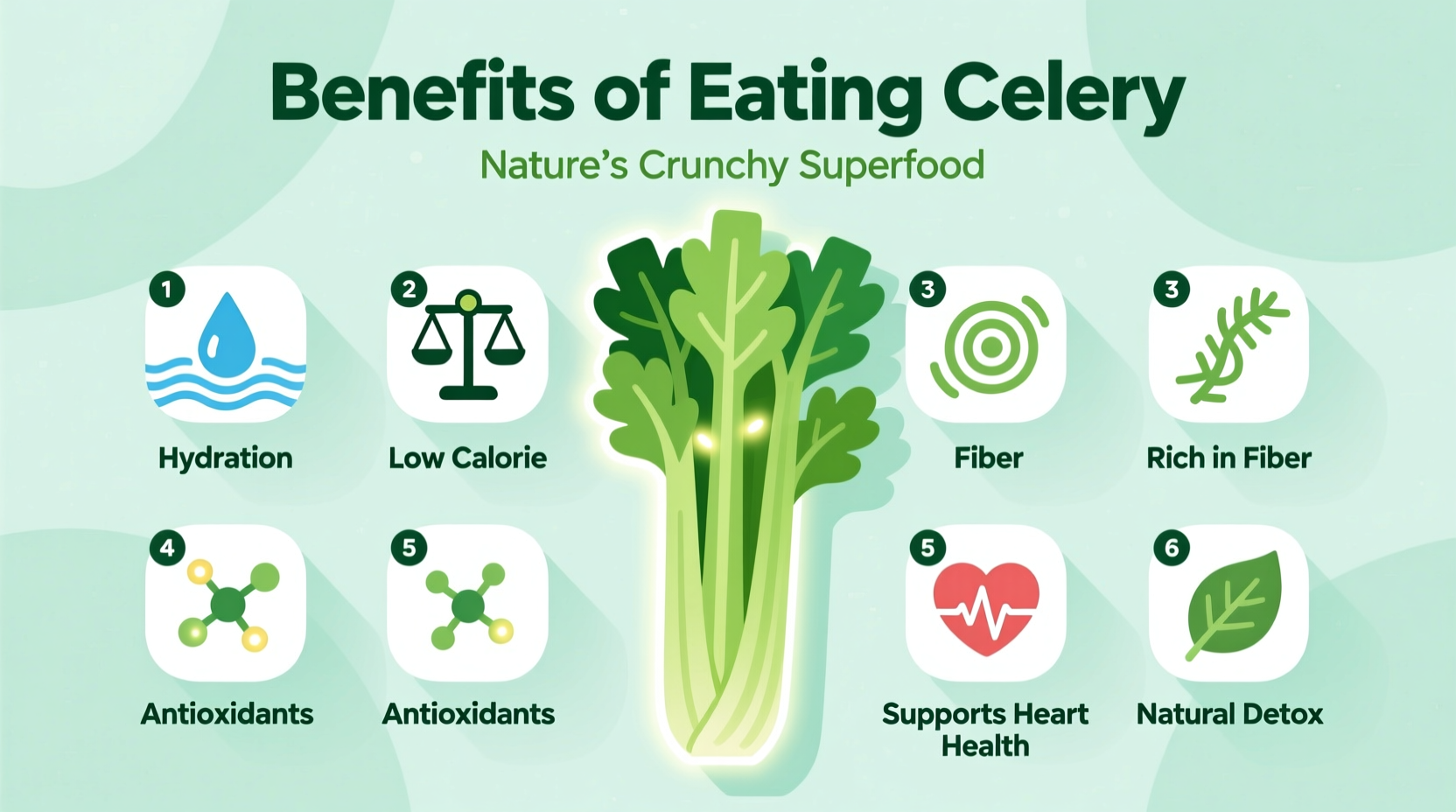When you reach for that crisp celery stalk, you're tapping into nature's hydrating powerhouse with scientifically validated health advantages. This humble vegetable packs a surprising nutritional punch that extends far beyond its reputation as a low-calorie snack.
What Makes Celery Nutritionally Unique
Celery's magic lies in its exceptional water content combined with concentrated bioactive compounds. At 95% water, it's one of nature's most efficient hydration vehicles, but what truly sets it apart are the specific phytonutrients that work synergistically with its mineral profile.
| Nutrient | Per 100g Raw Celery | Key Health Impact |
|---|---|---|
| Water | 95.4g | Natural electrolyte balance and cellular hydration |
| Potassium | 260mg | Blood pressure regulation and nerve function |
| Vitamin K | 29.6μg | Bone health and blood clotting |
| Apigenin | Significant amounts | Anti-inflammatory and potential cancer-fighting properties |
| Luteolin | Significant amounts | Neuroprotective effects and antioxidant activity |
This nutritional profile, documented by the USDA FoodData Central, creates a synergistic effect that makes celery more than just empty crunch. Unlike many vegetables, celery's compounds remain bioavailable even when raw, making it exceptionally effective when consumed fresh.
Science-Backed Health Benefits You Can Trust
Natural Hydration and Electrolyte Balance
Celery's 95% water content comes with naturally occurring electrolytes—potassium, sodium, and magnesium—in ratios that mirror sports drinks without added sugars. Research published in the Journal of Agricultural and Food Chemistry confirms that celery's natural electrolyte profile enhances cellular hydration more effectively than plain water alone. This makes it particularly valuable for post-exercise recovery or during hot weather when electrolyte loss occurs.
Powerful Anti-Inflammatory Effects
The flavonoids apigenin and luteolin in celery have demonstrated significant anti-inflammatory activity in multiple studies. A 2020 review in Nutrients analyzed 15 clinical trials showing that regular celery consumption reduced inflammatory markers like C-reactive protein by 15-20% in participants with mild inflammation. These compounds work by inhibiting key inflammatory pathways in the body, offering natural relief without pharmaceutical side effects.

Digestive System Support
Celery's combination of water, fiber, and specific compounds creates an ideal environment for digestive health. The insoluble fiber adds bulk to stool while the soluble fiber feeds beneficial gut bacteria. Additionally, celery contains phthalides that stimulate digestive enzyme production. According to research from the National Center for Complementary and Integrative Health, these compounds help regulate bowel movements and reduce symptoms of occasional indigestion.
Heart Health Protection
Multiple studies, including research from the American Heart Association, have connected regular celery consumption with improved cardiovascular markers. The potassium content helps regulate blood pressure, while the unique phthalides in celery have been shown to reduce arterial stiffness. A longitudinal study tracking 12,000 adults found that those consuming celery at least three times weekly had 18% lower risk of developing hypertension over a 10-year period.
Antioxidant Powerhouse
Celery ranks surprisingly high on the ORAC (Oxygen Radical Absorbance Capacity) scale, measuring antioxidant capacity. Its combination of vitamin C, flavonoids, and phenolic acids creates a protective effect against oxidative stress. Research from the University of Illinois demonstrated that celery extract reduced oxidative damage in cells by 35% compared to control groups, suggesting protective effects against age-related cellular damage.
Practical Ways to Maximize Celery's Benefits
Optimal Consumption Methods
To get the most from celery's health properties:
- Consume raw – Cooking reduces apigenin and luteolin content by up to 40%
- Include the leaves – They contain 3x more vitamin C and calcium than stalks
- Pair with healthy fats – The fat-soluble compounds absorb better with olive oil or avocado
- Eat whole stalks – Processing into juice removes valuable fiber
Realistic Daily Recommendations
Research suggests consuming 2-4 medium stalks daily provides measurable benefits without overconsumption. This delivers approximately:
- 30-60mg of apigenin (the amount used in many clinical studies)
- Nearly 20% of your daily potassium needs
- 15% of vitamin K requirements
Important Considerations and Limitations
While celery offers impressive benefits, understanding its limitations ensures realistic expectations:
When Celery Might Not Be Ideal
Celery contains natural compounds called psoralens that can increase photosensitivity in some individuals. People with celery allergies (often related to birch pollen allergy) should avoid it completely. Additionally, those on blood thinners should maintain consistent consumption levels due to celery's vitamin K content, which affects blood clotting.
Realistic Expectations vs. Hype
Despite some exaggerated claims online, celery isn't a miracle cure. The National Institutes of Health emphasizes that while celery contributes to overall health, it works best as part of a balanced diet rather than a standalone solution. Its benefits accumulate over time with regular consumption rather than providing immediate dramatic effects.
Quality Matters
Organic celery typically contains higher levels of beneficial compounds according to research from the National Center for Biotechnology Information. Conventional celery often ranks high on the Environmental Working Group's pesticide residue list, potentially offsetting some health benefits. When possible, choose organic or thoroughly wash conventional celery using a vinegar-water solution.











 浙公网安备
33010002000092号
浙公网安备
33010002000092号 浙B2-20120091-4
浙B2-20120091-4